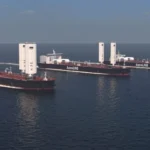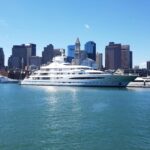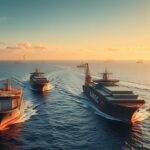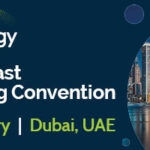DFT Freight Forecasts Signal End of Oil Era – NatPower Marine unlocking £10 billion in shorepower investments

(London, 26 August 2025) – The UK’s Department for Transport has today published new long-term forecasts showing a major shift in the way goods move through British ports, with oil and fossil fuel traffic expected to collapse while ferries, Ro-Ro and container shipping surge.
The UK Port Freight Traffic Forecasts (2024–2050) predict that overall volumes will rise modestly, from 420.6 million tonnes in 2023 to 453.5 million tonnes in 2050 (+7.8%). But the shape of that traffic will be transformed:
- Unitised freight (ferries, Ro-Ro and containers) is set to rise by 56.7%, becoming the largest segment of UK port traffic and accounting for over half (52.5%) of the total by 2050, up from just 34% today.
- Dry bulk cargo will increase by 61.7%, reflecting demand for ores and industrial materials.
- Liquid bulk (oil and oil products) will collapse by 63.3%, falling from 169.3 million tonnes to just 62.1 million tonnes as the energy transition takes hold.
The UK has seen a significant reduction in crude oil refining, with just 6 operational refineries today from 18 in the 1970s. The reliance on oil is dwindling and will only accelerate as the motor and energy sectors increasingly move towards sustainable options and demand for fossil-based products falls.
For ports and shipping operators, the message is clear: the growth is coming from sectors that can and must electrify.
NatPower Marine is poised to deliver change at ports around the world, investing heavily in the infrastructure to match this transformation. In partnership with Peel Ports Group, it is committing £100 million to electrify eight major UK and Irish ports, creating the first green shipping corridors across the Irish Sea.
By 2030, NatPower will deliver £250 million shorepower infrastructure, a global network of 120 clean ports, designed around the busiest commercial routes. Working directly with cruise, ferry and shipping lines, the company is building a route-based charging network that ensures vessels can plug into clean electricity at berth (cold ironing) and en route (propulsion charging).
This model not only reduces emissions but also directly tackles the Scope 3 emissions from vessel operations that make up the bulk of a port’s carbon footprint. By switching from bunker fuels to electricity, ships can cut CO2, NOx, and SOx emissions in port by up to 95%, improving air quality in surrounding communities by cutting port-hosting city pollutants by 35% while helping operators meet tightening IMO and UK net zero targets.
Stefano D. M. Sommadossi, CEO of NatPower Marine UK, said:
“The Government’s forecasts confirm the reality: the age of oil is ending, and the future of UK ports lies in electrified trade. The segments highlighted for growth, including ferries, Ro-Ro and container shipping, are also the ones best suited to clean shore power and e-charging. Without urgent investment, the UK risks gridlock at the very moment maritime trade is accelerating.”
NatPower Marine’s approach treats electricity as a new kind of fuel: time-critical, high-capacity demand that must be managed intelligently. By integrating large-scale battery energy storage with charging systems, ports can absorb surges when ships connect to the grid, protecting resilience while keeping costs predictable for operators.
In the UK only, NatPower is scaling to support maritime electrification with 12.5 GW of grid connection applications and 100 GWh of battery storage in development. Its clean energy ecosystem is designed to power vessels directly, ensuring shipping companies have access to reliable, emissions-free energy wherever they trade.
Sommadossi added,
“This is a once-in-a-generation infrastructure transition.”
“The Government’s forecasts show the future. Our job is to build the network that makes it possible.”
For further information and to arrange interviews, please contact:
Sue Terpilowski Image Line
+44 (0)207 689 9009
sue@imageline.co.uk
About NatPower Marine
NatPower Marine, part of the NatPower Group, is developing the largest independent network of ship charging facilities to provide clean electricity for propulsion and cold ironing as part of a fully integrated Smart Energy Transition-as-a-Service solution to the global maritime sector.
The company develops the essential end-to-end infrastructure required for the decarbonisation of global supply chain routes, providing shore power to support the electrification of ships for propulsion and cold ironing at berth, at anchor, and offshore.
The NatPower Group is a global energy transition developer with approximately 30 GW of natural power projects, with a presence in the UK, USA, Italy, and Kazakhstan, among others. The company has an ambitious expansion plan to become the largest and fastest growing global energy transition enabler. NatPower H, a subsidiary of NatPower Group, is currently building the world’s first green hydrogen refuelling station infrastructure for pleasure yachting.
About NatPower UK
NatPower UK is a sister company to NatPower Marine. NatPower UK has one of the largest clean energy development portfolios in the UK and will bring over 60 GWh of battery storage online in the UK by 2040, integrating large scale smart clean energy generation and distribution with large scale intermittent clean energy demand
More details here: https://seahorseclub.co.uk/latest-awards/















